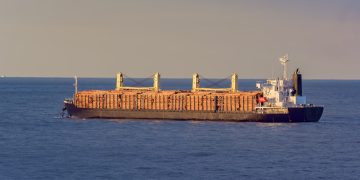Following the tanker attacks on Thursday, 13 June in the Gulf of Oman, the IMO Secretary General, the International Chamber of Shipping and INTERTANKO expressed their concerns, noting that this is an intolerable situation threatening the lives of seafarers, the environment and the world economy.
Two oil tankers were hit in a suspected attack in the Gulf of Oman on Thursday morning, leaving the one vessel ablaze and both adrift. The incident comes amid an ongoing tension in the Middle East, only a month after a similar incident in which four tankers in the region were struck.
Speaking during the Maritime Safety Committee MSC 101 session at IMO Headquarters in London, Secretary-General Lim said:
These suspected attacks, coupled with the attacks in the UAE last month, concern me greatly. IMO has developed a comprehensive regime of regulation through the ISPS Code and the SUA Conventions and Protocols to prevent and respond to unprovoked, unlawful attacks on merchant shipping. The threat to ships and their crews, peaceably going about their business, is intolerable. I urge all Member States to redouble their efforts to work together to find a lasting solution to ensure the safety and security of international shipping around the globe and protection of the marine environment. I will carefully review the results of the investigations, once they are completed, to consider if additional IMO action is warranted.
Addressing the issue at the ICS Annual General Meeting in the Faroe Islands, the ICS Board expressed the international shipping industry’s alarm at recent incidents in the region affecting ships and their crews.
The Straits of Hormuz are crucial for the world economy, and any deliberate attempts to threaten traffic through them are to be condemned in the strongest terms. The situation continues to develop, and we will scrutinize it closely, providing assistance to the industry to safeguard world trade and, most importantly, the lives of the men and women whose daily task it is to ensure its continued flow,
…said Guy Platten, ICS Secretary General.
Meanwhile, INTERTANKO added that these attacks appeared to be ‘well-planned and coordinated’, warning that the international shipping industry finds itself caught in the middle of a geo-political conflict over which it has no control.
This is a reckless attack on innocent seafarers who are being used as pawns and proxies in response to wider conflict. These attacks could also have resulted in a major pollution incident and calm heads need to prevail. The industry is working very closely together with all stakeholders to provide operational advice and guidance,
…INTERTANKO’s Marine Director, Dr Phillip Belcher noted.
Additionally, BIMCO highlighted that disruption of shipping through the Strait of Hormuz will have a major impact on the oil trade and the shipping industry.
The increase in attacks and the escalated threat to seafarers is an urgent concern to the industry. Following the two most recent attacks, and while we await the results of the investigations of the attacks, the tension in the Strait of Hormuz and the Persian Gulf is now as high as it gets without being an actual armed conflict,
…says Jakob P. Larsen, the BIMCO Head of Maritime Security.
Watch him talking to CNN herebelow:
With respect to the suspected attacks, the United Nations Secretary-General Antonio Guterres strongly condemned the incident, warning that the world cannot afford “a major confrontation in the Gulf region.”
I strongly condemn any attack against civilian vessels. Facts must be established and responsibilities clarified,
…he was quoted as saying during a meeting of the UN Security Council on cooperation between the UN and the League of Arab States.
The attacks were the second in a month near the Strait of Hormuz, a major strategic waterway for world oil supplies. Shortly after the incident, oil prices surged by 4%.
The United States and Saudi Arabia blamed Iran for last month’s attacks using limpet mines on four tankers off the coast of the United Arab Emirates, a charge Tehran denies.

































































